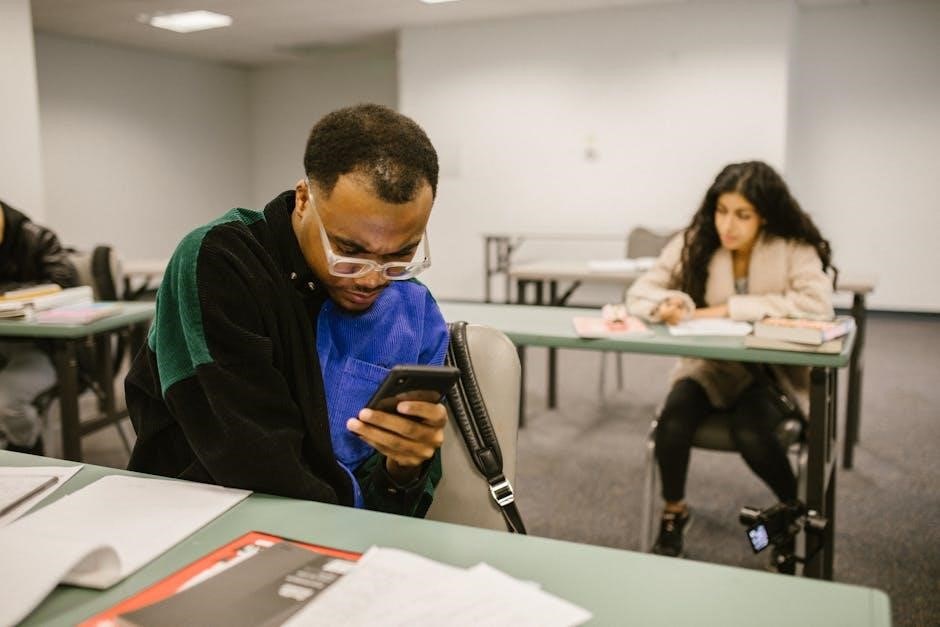Discover a comprehensive resource with engaging Catholic quiz questions and answers‚ designed to deepen faith understanding. This PDF offers multiple-choice queries on teachings‚ traditions‚ and history‚ ideal for personal study‚ group activities‚ or educational settings‚ catering to all knowledge levels.
Importance of Using Quiz Questions for Catholic Education
Using Catholic quiz questions and answers is an effective way to engage learners and deepen their understanding of Catholic teachings. Quizzes provide an interactive and fun method for religious education‚ making complex concepts more accessible. They help reinforce key doctrines‚ sacraments‚ and biblical stories‚ ensuring a strong foundation in the faith. By testing knowledge through multiple-choice or true/false questions‚ quizzes encourage active participation and retention of material. This approach also caters to different learning styles‚ making it ideal for both individual study and group activities. Additionally‚ quizzes foster healthy competition and a sense of accomplishment‚ motivating learners to explore more about their faith. Regular use of quiz questions can also help identify areas where further study is needed‚ allowing for targeted learning. Ultimately‚ incorporating quizzes into Catholic education creates a dynamic and engaging environment that supports spiritual growth and a deeper connection to the Church’s teachings.
Categories of Catholic Quiz Questions
Catholic quiz questions are organized into various categories‚ including Bible‚ Sacraments‚ Church History‚ Teachings and Doctrine‚ Liturgy and Rituals‚ Moral and Ethical Teachings‚ Mary and the Saints‚ Holy Week and Easter‚ Prayer and Devotions‚ and Church Structure and Hierarchy.
3.1 Bible Questions
Bible questions form a foundational category in Catholic quiz resources‚ testing knowledge of Scripture and its relevance to faith. These questions cover both the Old and New Testaments‚ focusing on key events‚ figures‚ and teachings. For instance‚ queries might ask about the books of the Bible‚ such as Exodus‚ which recounts the life of Moses‚ or Psalms‚ which contain sacred songs and prayers.
Other questions delve into the Gospels‚ exploring the life‚ miracles‚ and teachings of Jesus Christ. Participants might be asked to identify parables‚ such as the Prodigal Son‚ or to explain theological concepts like the Trinity. Bible questions also address moral lessons‚ such as the Ten Commandments or the Beatitudes‚ helping learners apply Scriptural wisdom to daily life.
Additionally‚ these quizzes often include inquiries about biblical figures‚ such as Abraham‚ Mary‚ or the Apostles‚ highlighting their roles in salvation history. The goal is to deepen understanding of the Bible’s message and its connection to Catholic doctrine and practices. This category is essential for fostering a strong Scriptural foundation in faith education.
3.2 Sacraments Questions
Sacraments questions are a vital part of Catholic quizzes‚ focusing on the seven sacraments and their significance in Catholic faith. These questions explore topics such as Baptism‚ Eucharist‚ Confirmation‚ Penance‚ Anointing of the Sick‚ Holy Orders‚ and Matrimony. For instance‚ queries might ask about the effects of Baptism‚ such as the forgiveness of sins and union with Christ‚ or the role of the Eucharist as a sacrament of nourishment and unity.
Questions may also delve into specific rituals‚ like the words spoken during the consecration of bread and wine or the symbols used in Confirmation. Additionally‚ sacraments questions often address moral and spiritual dimensions‚ such as the importance of contrition in Confession or the commitment required in Matrimony. These inquiries help deepen understanding of the sacraments’ role in spiritual growth and community life.
By testing knowledge of sacramental theology‚ these questions reinforce the centrality of the sacraments in Catholic practice and belief‚ making them an essential component of faith education and reflection.
3.3 Church History Questions
Church history questions provide a fascinating glimpse into the rich and complex journey of the Catholic Church‚ from its origins to modern times. These questions explore pivotal events‚ such as the Reformation‚ the Crusades‚ and the rise of the Papacy‚ as well as the lives of influential figures like saints‚ popes‚ and martyrs. For instance‚ queries might ask about the significance of the Council of Nicaea or the role of St. Augustine in shaping Christian theology.
Additionally‚ church history questions often examine key movements and doctrines‚ such as the Protestant Reformation and the Counter-Reformation‚ highlighting their impact on Catholic practices and beliefs. Other topics might include the missionary efforts of early Christians‚ the development of monasticism‚ and the role of the Church during historical crises like the Black Death or the fall of the Roman Empire.
By engaging with these questions‚ learners gain a deeper understanding of how the Church has evolved over centuries‚ adapting to cultural and societal changes while preserving its core teachings. This knowledge fosters a stronger connection to the faith’s heritage and its ongoing relevance in the world today.
3.4 Teachings and Doctrine Questions
Teachings and doctrine questions are essential for understanding the core beliefs and principles of the Catholic faith. These questions delve into the Catechism of the Catholic Church‚ exploring foundational doctrines such as the Trinity‚ the nature of God‚ and the role of the Holy Spirit. Queries might also focus on moral teachings‚ such as the Ten Commandments‚ the Beatitudes‚ and the importance of living a virtuous life.
Additionally‚ these questions examine key sacraments‚ such as Baptism‚ Eucharist‚ and Reconciliation‚ explaining their significance and how they impact spiritual growth. Topics like the role of Mary‚ the concept of purgatory‚ and the importance of prayer are also commonly addressed. For instance‚ a question might ask‚ “What is the significance of the Assumption of Mary?” or “How does the Catholic Church view the sacrament of Matrimony?”
By engaging with these questions‚ learners gain clarity on complex theological concepts and develop a stronger grasp of Catholic doctrine. This section is particularly useful for reinforcing understanding of essential teachings and fostering a deeper connection to the faith.
3.5 Liturgy and Rituals Questions
Liturgy and rituals questions explore the heart of Catholic worship and practices. These questions cover various aspects of the Mass‚ sacraments‚ and traditional ceremonies‚ helping participants understand their meaning and significance. For example‚ queries might focus on the structure of the Mass‚ such as the difference between the Liturgy of the Word and the Liturgy of the Eucharist‚ or the role of sacramentals like holy water and candles. Additionally‚ questions might delve into the symbolism behind gestures‚ such as the sign of the cross or kneeling during specific parts of the Mass.
Other topics include the liturgical calendar‚ such as the significance of Advent‚ Lent‚ and Easter‚ and the importance of feast days honoring saints. Rituals like the Stations of the Cross‚ the Rosary‚ and Eucharistic Adoration are also common subjects. These questions help deepen understanding of how Catholics worship and express their faith. By engaging with these queries‚ individuals can better appreciate the richness and depth of Catholic liturgical traditions and their role in spiritual life. This section is invaluable for fostering a deeper connection to the Church’s rituals and practices.
3.6 Moral and Ethical Teachings Questions
Moral and ethical teachings questions are designed to explore Catholic principles on right and wrong‚ guiding followers in making informed decisions. These questions cover topics like the role of conscience‚ natural law‚ and the Ten Commandments in shaping moral behavior. Queries might address specific ethical dilemmas‚ such as euthanasia‚ abortion‚ or divorce‚ and how the Church views these issues. Additionally‚ questions may focus on virtues‚ such as charity‚ justice‚ and forgiveness‚ and their importance in living a morally upright life.
Other areas include the Church’s teachings on social justice‚ caring for the poor‚ and protecting human dignity. Questions might also delve into the moral implications of modern issues‚ such as stem-cell research or artificial intelligence. By engaging with these questions‚ individuals can gain a deeper understanding of how Catholic moral teachings apply to everyday life and complex societal challenges. This section is particularly useful for fostering a stronger grasp of the Church’s ethical framework and its relevance in contemporary contexts.
3.7 Mary and the Saints Questions
Questions about Mary and the Saints are a vital part of understanding the rich devotional life and traditions of the Catholic Church. These questions explore the significant roles of the Blessed Virgin Mary and various saints‚ highlighting their lives‚ teachings‚ and contributions to the faith. Topics include Mary’s titles‚ such as the Mother of God and the Immaculate Conception‚ as well as key events like her Assumption and apparitions. Additionally‚ questions may focus on the lives of prominent saints‚ their feast days‚ and their patronage over specific causes or professions.
Some questions delve into the importance of sainthood‚ the process of canonization‚ and the role of saints as intercessors. Others may ask about the cultural and historical contexts of devotion to Mary and the saints‚ their influence on Church art and architecture‚ and their relevance in modern spirituality. These inquiries help deepen one’s appreciation for the saints as models of faith and inspire personal devotion to Mary and the holy men and women who have shaped Catholicism. This section is ideal for learning about the spiritual heroes of the Church and their enduring impact on Catholic identity.
3.8 Holy Week and Easter Questions
Holy Week and Easter are central to the Catholic faith‚ commemorating the Passion‚ death‚ and resurrection of Jesus Christ. These questions explore the liturgical practices‚ traditions‚ and theological significance of this sacred period. Topics include the events of Palm Sunday‚ the Last Supper‚ Good Friday‚ and Easter Sunday‚ as well as the symbolism behind them.
Questions may focus on the Stations of the Cross‚ the Paschal Triduum‚ and the meaning of Easter as a time of renewal and hope. Other inquiries might examine the biblical accounts of Christ’s resurrection‚ the role of the Virgin Mary during Holy Week‚ and the significance of Easter traditions such as the Easter Vigil and the Paschal Candle.
These questions also delve into the connection between Holy Week and the sacraments‚ particularly Reconciliation and the Eucharist. By engaging with these topics‚ participants gain a deeper understanding of the spiritual journey from Lent to Easter and the core beliefs of Catholicism. This section is invaluable for enriching one’s faith and appreciation for the redemption brought by Christ’s sacrifice.
3.9 Prayer and Devotions Questions
Prayer and devotions are vital components of Catholic spirituality‚ fostering a deeper relationship with God and the saints. This category of questions explores various forms of prayer‚ such as the Rosary‚ the Stations of the Cross‚ and the Divine Mercy Chaplet‚ as well as common devotional practices like Eucharistic Adoration and novenas.
Questions may focus on the significance of specific prayers‚ such as the Apostles’ Creed‚ the Our Father‚ and the Hail Mary‚ and their role in Catholic worship. Other topics might include the meaning of liturgical prayer‚ the importance of prayer in daily life‚ and the intercession of saints. These inquiries also examine the theological foundations of prayer‚ such as its role in expressing praise‚ thanksgiving‚ and petition to God.
By engaging with these questions‚ participants can gain insights into the rich traditions of Catholic devotions and how they enrich spiritual life. This section helps deepen one’s understanding of prayer as a means of growing closer to God and living out the faith with greater intentionality and devotion.
3.10 Church Structure and Hierarchy Questions
Understanding the structure and hierarchy of the Catholic Church is essential for grasping its organization and function. This category of questions delves into the roles and responsibilities of key figures within the Church‚ such as the Pope‚ bishops‚ priests‚ and deacons. It also explores the administrative divisions‚ including dioceses‚ parishes‚ and religious orders.
Questions may cover topics like the authority of the Pope as the successor of St. Peter‚ the role of bishops in leading local dioceses‚ and the duties of priests in serving parish communities. Additionally‚ inquiries might address the significance of Vatican Councils‚ the structure of the College of Cardinals‚ and the process of selecting a new Pope. These questions also examine the role of laity in the Church’s mission and the importance of collaboration between clergy and laypeople.
By exploring these topics‚ learners gain a clearer understanding of how the Church operates and how its hierarchical structure supports its global mission. This section is vital for fostering appreciation of the Church’s organizational framework and its role in preserving and sharing the Catholic faith.

Benefits of Using PDF Format for Catholic Quizzes
The PDF format offers numerous advantages for creating and sharing Catholic quiz resources. One of the primary benefits is its portability‚ allowing users to access quizzes on any device without losing formatting. This ensures consistency in how questions and answers appear‚ whether viewed on a computer‚ tablet‚ or smartphone.
Another significant advantage is the ease of sharing. PDFs can be quickly downloaded from websites or emailed to individuals‚ making them highly accessible for religious education‚ personal study‚ or group activities. Additionally‚ PDFs are self-contained files that do not require specific software to view‚ beyond a standard PDF reader‚ which is widely available.
The format also supports professional presentation‚ with clear typography and structured layouts that enhance readability. This makes the learning experience more engaging and organized. Furthermore‚ PDFs can be easily printed‚ offering flexibility for those who prefer physical copies for group discussions or classroom use.
Overall‚ the PDF format provides a convenient‚ reliable‚ and visually appealing way to distribute and use Catholic quiz questions‚ making it an ideal choice for educational and faith-building purposes.
Tips for Creating Effective Catholic Quiz Questions
Creating effective Catholic quiz questions requires careful thought and planning to ensure they are engaging‚ educational‚ and faith-enriching. Start by focusing on clear and specific questions that target key concepts‚ such as Bible verses‚ sacraments‚ or Church teachings. Avoid ambiguity to prevent confusion and ensure participants can answer confidently. Use a variety of question types‚ such as multiple-choice‚ true/false‚ and open-ended questions‚ to cater to different learning styles and keep the quiz dynamic.
Incorporate questions that cover a range of difficulty levels‚ from basic to advanced‚ to accommodate participants with varying knowledge backgrounds. Ensure the answers are accurate and aligned with official Catholic doctrine‚ referencing reliable sources like the Catechism of the Catholic Church. Provide brief explanations for correct answers to reinforce learning and clarify common misunderstandings.
Finally‚ test the questions with a small group before widespread use to identify and refine any unclear or misleading queries. This process ensures the quiz is both enjoyable and effective in deepening participants’ understanding of the Catholic faith.
Sample Questions from Popular Catholic Quizzes
Engage your knowledge of the Catholic faith with these sample questions from popular quizzes‚ designed to test understanding and inspire further study.
- Question: What is the central mission of the Catholic Church?
Answer: Building the Kingdom of God. - Question: Through which sacrament does a person become a Catholic Christian?
Answer: Baptism. - Question: Who is the successor of Saint Peter as the leader of the Catholic Church?
Answer: The Pope. - Question: What is the name of the table in the sanctuary where the Eucharist is celebrated?
Answer: The altar. - Question: What is the feast day that commemorates the Resurrection of Jesus Christ?
Answer: Easter.
These questions cover a range of topics‚ from basic teachings to specific traditions‚ making them ideal for quizzes‚ study groups‚ or personal reflection. They encourage learners to delve deeper into the richness of Catholic faith and practice.

Common Challenges and Mistakes in Catholic Quizzes
Participating in Catholic quizzes can be both educational and rewarding‚ but several common challenges and mistakes often arise. One major issue is the misinterpretation of Church teachings‚ particularly regarding sacraments and doctrines. Many participants confuse similar concepts‚ such as the differences between mortal and venial sins or the roles of the Holy Spirit versus the Trinity.
- Trick questions: Some quizzes include ambiguous or misleading questions that test literal knowledge rather than understanding‚ leading to confusion.
- Historical inaccuracies: Misremembering key events‚ such as the timing of Vatican Councils or the lives of saints‚ is a frequent mistake.
- Overcomplicating answers: Participants often overthink simple questions‚ resulting in incorrect responses.
- Lack of familiarity with Scripture: Many struggle with Bible-related questions‚ especially those requiring specific verse citations.
To avoid these pitfalls‚ it’s essential to thoroughly review Catechism of the Catholic Church and biblical texts. Additionally‚ understanding the context of Church history and doctrine can significantly improve accuracy. By addressing these challenges‚ learners can enhance their knowledge and perform better in Catholic quizzes.

How to Use Catholic Quiz PDFs Effectively
Catholic Quiz PDFs are versatile tools that can enhance learning and retention of Catholic teachings. Start by using them for self-assessment to identify strengths and areas needing improvement. For group activities‚ incorporate quizzes into classroom settings or parish workshops to foster engaging discussions and collaborative learning.
- Set goals: Establish clear objectives‚ such as mastering specific doctrines or understanding sacraments.
- Track progress: Keep a record of scores or correct answers to monitor improvement over time.
- Review mistakes: Spend extra time understanding incorrect answers to avoid repeating errors.
- Discuss results: Use quizzes as a springboard for deeper conversations about Catholic beliefs and practices.
For individuals‚ quizzes can serve as a personal study aid‚ while for educators‚ they provide structured content for lessons. Utilize the answer keys for immediate feedback and clarification. By integrating Catholic Quiz PDFs into your learning routine‚ you can create an engaging and effective path to mastering Catholic faith and traditions.

Popular Resources for Catholic Quiz Questions
Several resources are widely recognized for providing high-quality Catholic quiz questions. Karl Keating’s “The Toughest Catholic Quiz” is a popular choice‚ offering 100 multiple-choice questions on various Catholic topics. Another notable resource is the Marian Quiz by the Diocese of Gaylord‚ which focuses on questions about Mary and the saints. Additionally‚ the Catechism Bee Questions document is ideal for younger learners‚ covering fundamental Catholic teachings. Websites like Our Sunday Visitor also provide accessible quiz materials for both individual and group use. These resources are designed to cater to different age groups and knowledge levels‚ making them versatile tools for Catholic education. By utilizing these materials‚ individuals and educators can create engaging and informative quiz sessions that deepen understanding of the Catholic faith;
Interactive Learning with Catholic Quizzes
Interactive learning through Catholic quizzes has become a dynamic way to engage individuals and groups in faith education. These quizzes are designed to be more than just tests of knowledge; they foster active participation and collaboration. Many resources incorporate gamification elements‚ such as scoring systems‚ timers‚ and team-based challenges‚ to make learning fun and competitive. Platforms like Kahoot! and Quizlet offer digital tools to create and share Catholic quiz questions‚ allowing for real-time interaction and immediate feedback. Group activities‚ such as trivia nights or catechism bees‚ also encourage community bonding while reinforcing Catholic teachings. For individual learners‚ interactive PDFs with clickable questions and answers provide a self-paced‚ immersive experience. These methods not only enhance retention of Catholic doctrine but also make learning accessible and enjoyable for people of all ages. By integrating technology and social interaction‚ interactive Catholic quizzes create a vibrant and engaging environment for faith formation.

Cultural Significance of Catholic Quiz Questions
Catholic quiz questions hold profound cultural significance‚ serving as a bridge between faith and community. These quizzes are not merely educational tools but also a means of preserving and celebrating Catholic traditions‚ beliefs‚ and history. They often reflect the values and practices passed down through generations‚ fostering a sense of identity among Catholics worldwide. Many quizzes incorporate stories of saints‚ key events in Church history‚ and moral teachings‚ which reinforce cultural heritage. Additionally‚ they provide a platform for shared experiences‚ as families‚ schools‚ and parishes gather to test their knowledge and deepen their understanding of the faith. The interactive nature of these quizzes also highlights the communal aspect of Catholicism‚ emphasizing unity and collective learning. By engaging with these questions‚ individuals not only gain knowledge but also connect with the broader Catholic community‚ strengthening their cultural and spiritual ties. In this way‚ Catholic quiz questions and answers serve as a vibrant expression of faith and tradition‚ transcending mere education to become a cultural cornerstone.
As Catholic education continues to evolve‚ the integration of interactive and digital learning tools will play a pivotal role. The future likely holds enhanced versions of these quizzes‚ incorporating multimedia elements and adaptive learning technologies to cater to diverse learning styles. Additionally‚ the emphasis on community engagement through group activities and competitions will remain central to fostering a deeper connection to the faith.
Ultimately‚ the combination of traditional values and modern educational methods ensures that Catholic quiz questions and answers will remain a cornerstone of religious education. By inspiring curiosity‚ promoting lifelong learning‚ and nurturing spiritual growth‚ these resources will continue to shape the future of Catholic education effectively.



